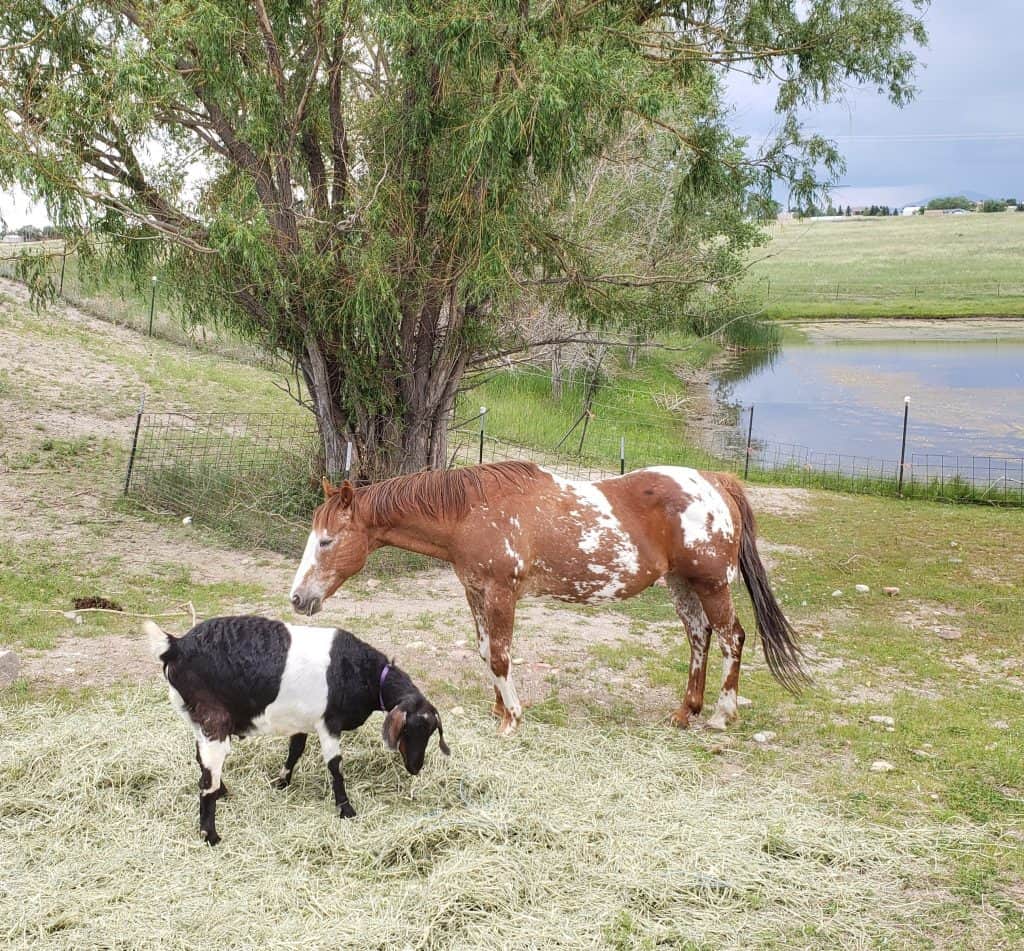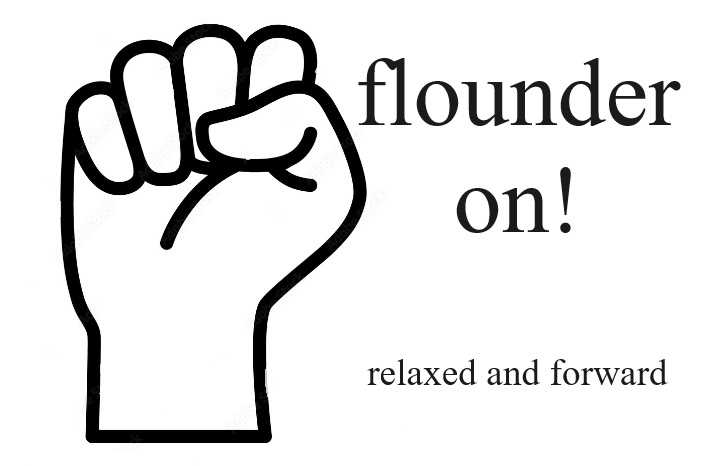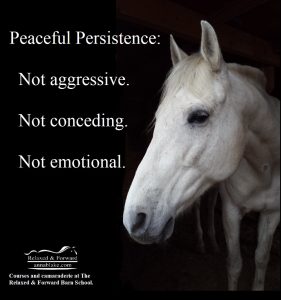
We are sick to death of the violence against horses. It isn’t just the damage caused by rollkur in reining and dressage, or racing youngsters until their legs break, or the tragic mess rodeo has become, or the horses being tossed to auction for the crime of being old or lame. My personal thorn in the eye is the general acceptance of fear-based training in horses too young to be ridden. The numbers are astronomical, way higher than the abuse stories that hit the news. How did terrifying youngsters become so common that we barely notice it? Researchers inform us that they found the fabled “dominance hierarchy” in only one genus. Want to guess who?
The thing I hear most often from critics is that affirmative training will get people hurt. As if we need a lion tamer’s whip and chair to be with horses. What silliness. Peace happens when one side stops fighting. Is it possible that they’ve never tried it?
We don’t hear the criticism because we have some understanding of stress messages, what we call Calming Signals. We see the horse’s emotions, their fear and panic, perhaps more clearly than others. It’s like the glass is broken and now we can perceive the cruelty, but it causes sharp slivers in our eyes. It practically blinds us and still, we can’t unsee it.
The awareness of abuse leaves a mark on us. It gives their cruelty a second shadow life in our home barns when we allow ourselves to be colored by the misdeeds of others. We scrutinize ourselves more closely than railbirds ever would. There is an extra layer of pressure to be perfect, as if we have a chance of sliding into wickedness if we blink an eye. Thoughts of that violence linger in the air when working with our own horses. With the best intentions, we question our confidence.
So afraid of damaging our horses, we walk on eggshells and second-guess ourselves. We are so careful to go slow that horses wonder if we are too dim to partner with. Sometimes we don’t dare to experiment or ask them advanced questions for fear of being misunderstood by our horses. We censor ourselves, practically disabled by the cruelty of others, even though we are kind. And then we loudly proclaim our tiny misdeeds twice as often as our successes.
I shouldn’t have to say this. We are not the bad guys. Please stop acting guilty. It makes the horses nervous.
For all the methods we would never use, shouldn’t there be a clean, easy, and somewhat straight path to training correctly? Maybe a One-Step Process to Kind Training for the Horse of Your Dreams, just $19.99? That illusion of an easy method was the sales pitch for harsh training, remember?
In horse training, there isn’t one clear path. There is no one-size-fits-all. It isn’t just that every horse is unique and every human one of a kind… it’s that every pairing adds up to twice as much rarity. A different meaning to the idea of oneness. Each horse and human twosome are just that wildly exceptional.
But we don’t trust ourselves. It feels almost normal to not want to make a move before we know it’s right, but are we gasping for air in a corset of our own perfectionism? Girls, let out your gut and breathe some fresh air in. Howl at the moon, muck in your pajamas, ride at dawn, but for crying out loud, do not let the haters win. Do you have a dark secret that in your past you were cruel because someone told you to? Lay that burden down. We all did the same. We weren’t perfect when we started with horses and aren’t perfect now. That’s the good news. Imperfection is part of being unique, it’s the crack that lets possibility in.
Forgive yourself, so your horse can be free of your past mistakes. Please stop apologizing. It makes horses nervous.
In this light, let your horse be imperfect. More than that, celebrate it. Tell them they’re good when they get nervous, to remind them who they are. Be emotionally consistent because a partner should be dependable. Like us, most horses have experienced the bad side of horse training, but we can build new habits. We can be consistent in our affirmation of horses on all days. We can become trustworthy. Horses understand what we want and if we accept that some days, they can’t do it, our connection grows stronger. They begin to trust that we can listen as well as ask.
The alternative to needing to be perfect is acceptance. Of course, there are going to be ups and downs, brilliance and lameness. If your horse can have bad days now and then, he can rise above on other days and show you something you didn’t know. We can keep our awareness sharp without being critical, we can just say yes and not let the past damage the future. By celebrating all these things, our horses can grow from uncertain youngsters to steady confident adults, and if we are very lucky, on to the golden days of an old campaigner. Partners for life. Could anything be sweeter?
We take ourselves so seriously. Rising above the fray is over-rated. Horses don’t judge us, only caring about their safety. They are more resilient and spontaneous. This is the trade. Learn the important things from your horse. Take a nap after breakfast. Roll in the dirt, stay out in the rain. And stop fussing with your hair. Trade perfection for the peace of barn quiet, the joy of spontaneity, and the chance to see the world through another’s eyes. Let winning mean that we don’t quit. It won’t be pretty every moment, but it doesn’t have to be. Laugh it off and flounder on.
Perfection is not real. Invariably, we hit bumps and blind curves, and so much is beyond our control. Some things will have to change to make way for the new things we can’t yet imagine. We can clutch the past and simmer in resentment and self-loathing, or we can smile and flounder on through what life gives us. Floundering on means progress forward. Floundering on means we accept all the parts of ourselves without condition. Perfect in our imperfection. Just like a horse, alive in each moment.

…
By request, the Flounder On! swag is now available at https://www.zazzle.com/store/relaxedandforward
…
Relaxed and Forward Training by Anna Blake is no longer on Facebook because of repeated hacking. If you appreciate what I write, please share, subscribe to this blog, or join us at The Barn School.
 The Barn School, is a social and educational site, along with member sharing and our infamous Happy Hour. Anna teaches courses like Calming Signals and Affirmative Training. Everyone’s welcome.
The Barn School, is a social and educational site, along with member sharing and our infamous Happy Hour. Anna teaches courses like Calming Signals and Affirmative Training. Everyone’s welcome.
Want more? Become a sustaining member, a “Barnie.” Subscribe to our online training group with affirmative demonstration videos, audio blogs, daily quotes, free participation in “group lessons”, and live chats with Anna. Become part of the most supportive group of like-minded horsepeople anywhere.
Visit annablake.com to find archived blogs, purchase signed books, schedule a live consultation, subscribe for email delivery of this blog, or ask a question about the art and science of working with horses.
Affirmative training is the fine art of saying yes.
…
 Available Now! Undomesticated Women, Anectdotal Evidence from the Road, is my new travel memoir. Ride along with us on a clinic tour through 30 states, 2 oceans, and 14k miles with me and my dog, Mister. It is an unapologetic celebration of sunsets, horses, RV parks, roadkill, diverse landscapes, and undomesticated women. Available now at Amazon, Barnes and Noble, and signed copies from me.
Available Now! Undomesticated Women, Anectdotal Evidence from the Road, is my new travel memoir. Ride along with us on a clinic tour through 30 states, 2 oceans, and 14k miles with me and my dog, Mister. It is an unapologetic celebration of sunsets, horses, RV parks, roadkill, diverse landscapes, and undomesticated women. Available now at Amazon, Barnes and Noble, and signed copies from me.
…
FLOUNDER ON! The most inspirational slogan yet invented, especially for working with horses❤️🎉
Hehehe. Thanks, Susan
I don’t know what my mantra should be? It has been “Not that I care” but “Flounder on” does have a ring to it.
I guess, flounder on, not that I care… Thanks Peggy.
A thousand yes’s!!!
It’s a thing we do well, writing and riding. Thanks, my friend.
The thing is, what you have written here rings true for, well, everything! Thanks for that.
It’s served me as well out of the barn. Thanks, Julie
So, our teacher stopped me while riding Toushay (4 years old), put her hand on my leg and said, “She’s trying as hard as she can.”
I never forgot those words and try to live up to them with my now beautiful horses.
It’s music to read Toushay’s name and I am always thinking of our teacher. We are their legacy, Susan. If we try a fraction of how hard horses try, we are golden.
You made me cry. Thank you for telling this story.
yes. flounder on!!!! YES!
Especially if we live with long ears. Thanks, Kate
This is brilliant, a blog to save and re-read. Two things: I finished the first draft of the memoir and so much of it involves the evolution from the domination training we learned as youngsters to what you teach about calming signals. It was twenty years of floundering and mistakes. Now I have a young horse who has not been subjected to those old methods, and training so far has been too easy. I’m trying not to hold my breath. How did we miss this for so long? Flounder on, indeed. (And exhale.) Thanks Anna.
And what a blessing to get another chance. Never too late for horse or us. Thanks Kaylene. (and bring on the book.)
Thank you for these thoughts – I need them.
Also – a question of how I might work with one of my 4 horses who is very aggressive and chases an old mare. I keep them separate( with a buddy) but is there a way to let the aggressor know this is not behavior I want ? These 2 accidentally got into the same space and the aggressor quickly bit and chased the old mare causing her to fall. ( She’s ok). But these accidents can happen and I’d like to have the aggressor know he doesn’t need to react. Any ideas?
Thank you.
Lynn
Aggression is never helped by more aggression, but I understand the problem, especially for your mare. I don’t know enough about when and how the aggression is shown. But my first thought is that the aggressive horse is in pain. It isn’t normal horse behavior, and he may be aggressive as a method of displacement. He isn’t mad at her, she is just the easiest to aggress on… but he is “talking” about himself. For instance, a horse with gastric issues might become food aggressive even if there is plenty of hay out. Good luck resolving this, Lynn.
We need coffee cups that say Flounder On!
Working on it, Mary. Flounder on!
I’m slowly learning this – it is very freeing to embrace the imperfections
It does feel good, doesn’t it. Thanks, Brycie
Proud to be a member of the Flounder On Club…thanks, Anna!
In very good standing, Lynell. Thanks
Oh. My. Goodness. I need to read this daily. And I agree about a coffee cup or tshirt!
Committed flounderer.
Thanks, Jill. Glad to have you with us.
Thank you. Thank you. Thank you. My horses thank you too. Flounder on. Horse goals for 2024 now sorted 🌟🌟🌟
So smart!!! In two words! Thanks, Rebecca.
Please and thank you, may I have a sticker with “Flounder On! relaxed and forward” please?
I cannot express the gratitude in words that I feel each week for your the blog/newsletter in my mailbox. The best I can do is continue to say “William, good boy,” and “Thank you sweet William.” And do so more often with my eyes, ears, and heart.
Well maybe a bumper sticker and a billboard too, please.
“Flounder On,” is permission for so many things.
Yay.
Our dear William… Thanks, Kim. (And I’m working on flounder swag.)
Yep..walking the earth with imperfection and understandings. It’s who we are if we ket it be.
Thanks again Anna for your wisdom.
Thanks, Sheri.
No equine here to flounder on with, but it applies to other species too! Thanks. Anna
Like humans? I agree, it’s my life plan. Thanks, Maggie!
Anna,
Can’t wait to continue my floundering under your guidance with affirmative groundwork on the 9th!
And I’m looking forward to learning more about your boys. Thanks Laurie.
Put me down for a Flounder on! T-shirt. Hoo boy: regret, guilt, and insecurity…the killers of a joyful connection, or even a connection at all? Thanks for pointing this out. I needed to hear it. Again. That makes what? Time 4,870 thousand? Why do we think flogging ourselves is..noble…proof we’ve changed…deserved….? I am certainly guilty of having repeated the harsh training methods. Of not hearing, let alone listening. And I have beat myself to a pulp over past horses I didn’t see or treat respectfully. And…you are so right. I have to let it go in a rather ruthless manner. It doesn’t mean I think I was fine. I just can’t be good in THIS moment if I’m still harboring that moment. Joy is a powerful motivator for horses. My heart says the work has to be fun. The more often the better. I’m not very fun if I hate myself! Bravo Anna!
Amen. What a great comment, Jane. Not to mention that letting go of guilt is the best crash diet ever, talk about losing the ugly pounds!!!
This message and these comments are timely for me, as I am a self-flogger of massive proportions. I’ve tried to grasp as much as I can in the short time I’ve had horses, but am always faced with so much self-doubt when working with them. “How much is too much? How little is too little? “. I’m rarely sure, so I just end up going for a trail ride, where my horse and I are quite comfortable. 🤷🏼
In recent months I have found myself just a little less reluctant to fail in the arena, and I think we are making progress. “Flounder On” describes it perfectly! At 64, with just 6 years of horses in my life, it’s time to quit “wallering” in my lack of experience and get real comfortable with floundering, before I run out of time to have fun with it!
Anna, I give you much credit for helping me rethink my horse time. Thank you for that.
Thanks, Terri. Sometimes it feels to me like once we stop punishing horses every second, somehow it lands on us. We have to stop. How much is too much? Let your horse tell you. It’s just easier to stay in the conversation. that’s the win.
BTW, I consider myself pretty unflappable at this point. I credit competing my horses. I have been embarrassed so much, that I used it all up. And I’m grateful.
By request, the Flounder On! swag is now available at https://www.zazzle.com/store/relaxedandforward
It’s perfectly imperfect, too.